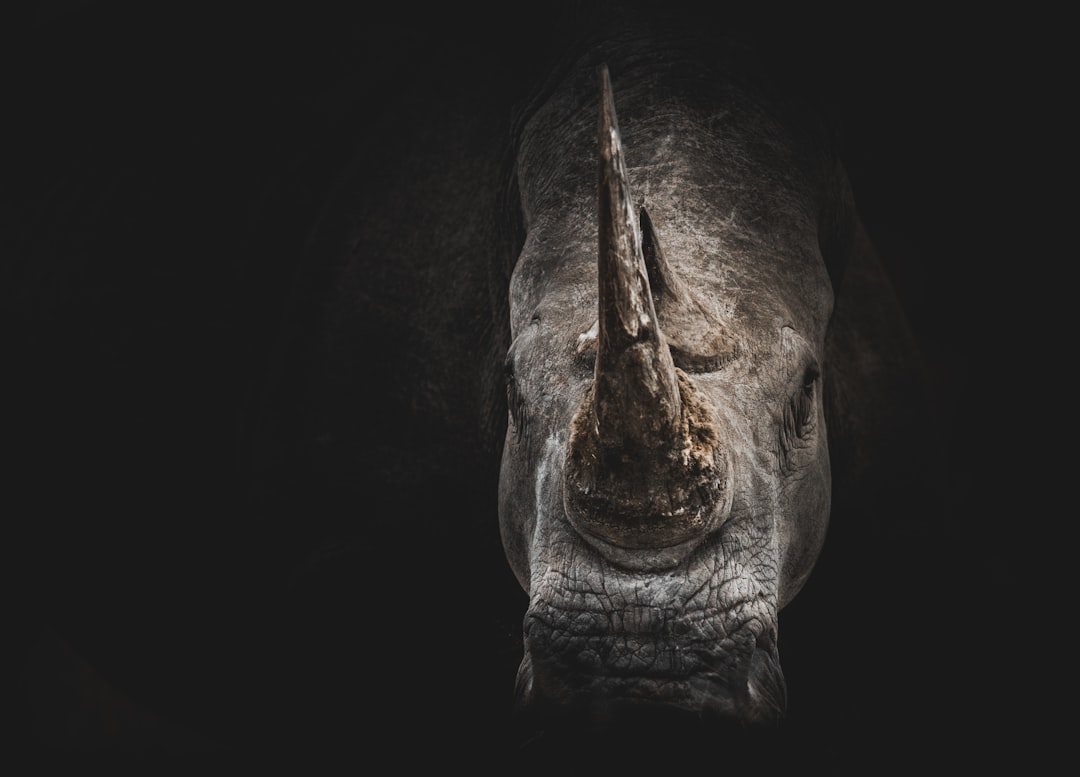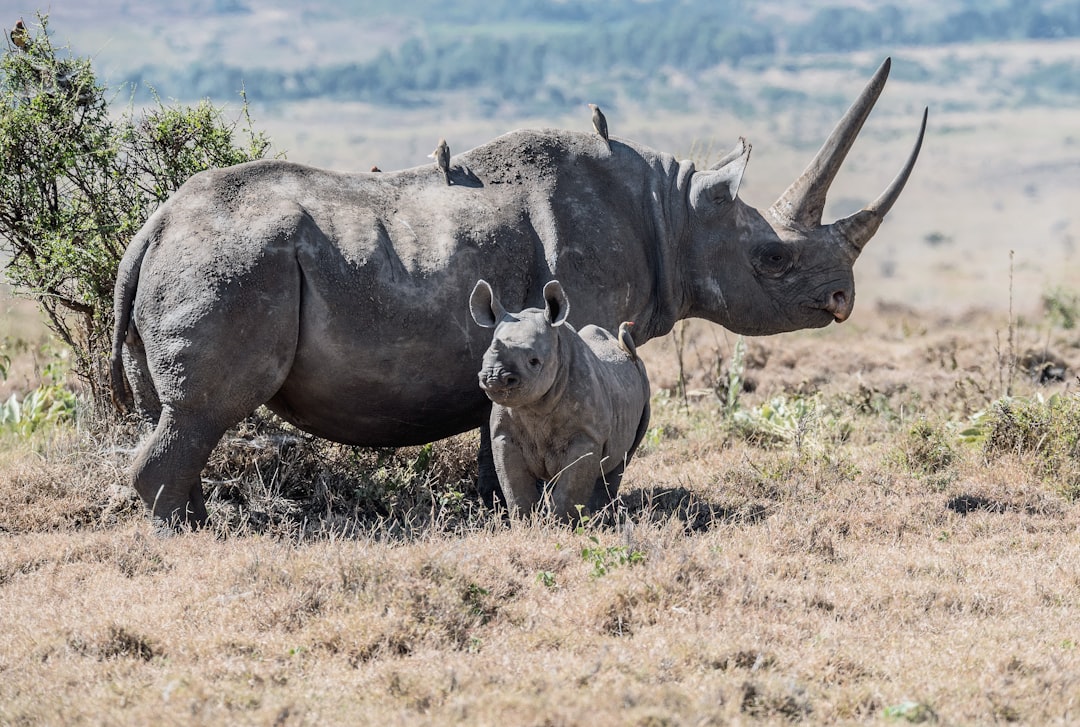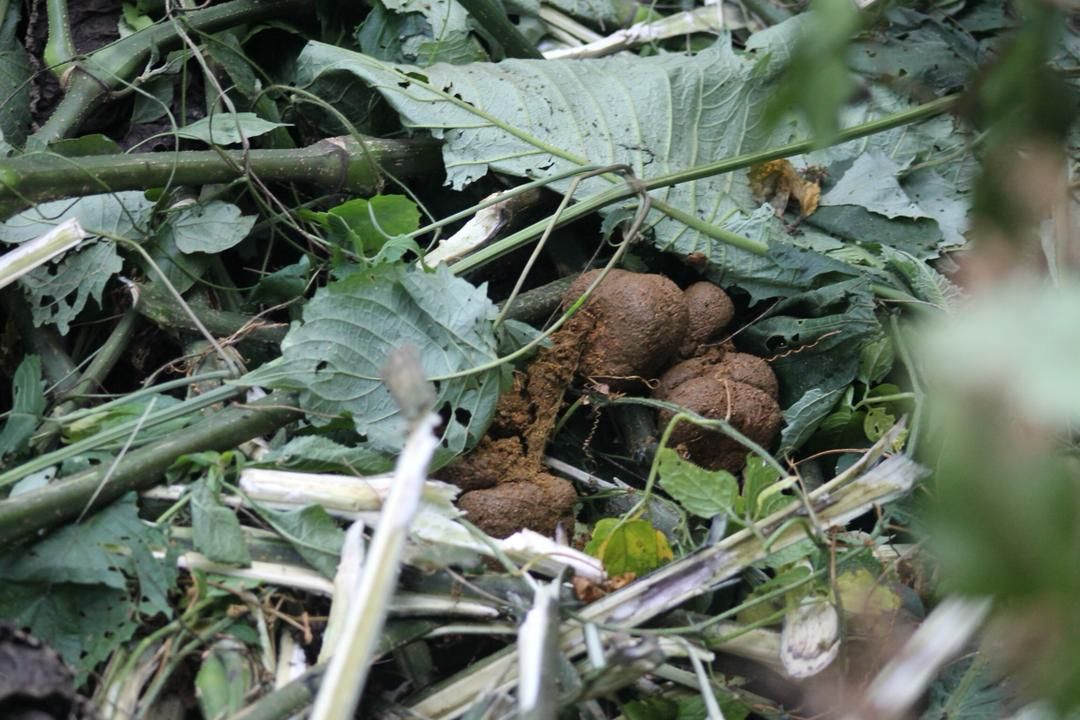
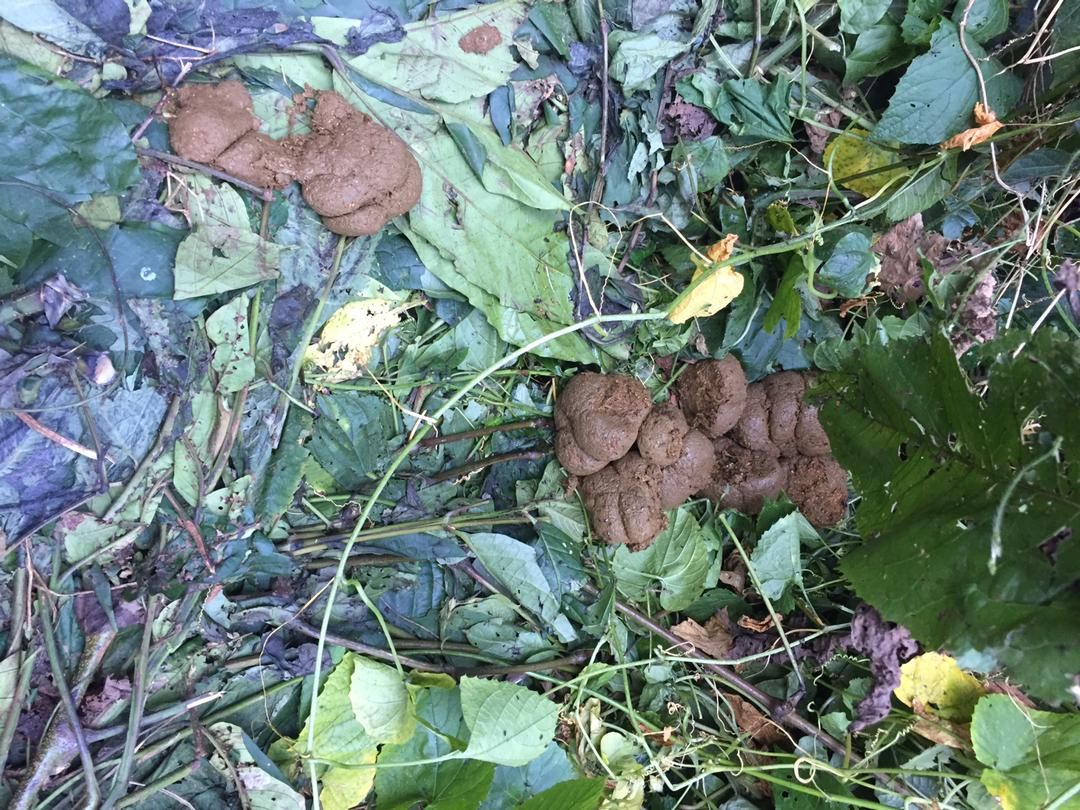
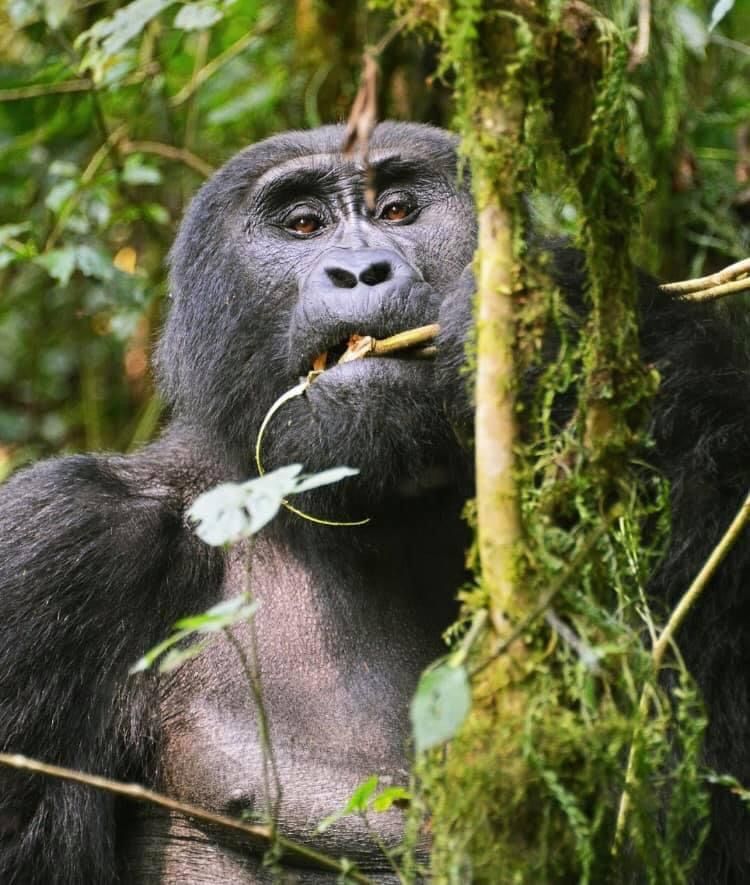
Sending you lovely greetings from the land of mountain
Gorillas and the Pearl of Africa. Following our interaction last week, I come
here again with some facts about mountain Gorillas, which I have learnt throughout.
Truly I first encountered them, when I was 5 years old,
since then my experience and love for them has been interesting
. Gorillas are ground-dwelling, predominantly herbivorous
great apes that inhabit the tropical forests of central Sub-Saharan Africa. The
Gorilla genus is divided into two species the eastern gorillas and the western
gorillas, and either four or five subspecies. They are the largest remaining
primates (Apes) on earth.
As our main focus is on Mountain gorillas, mountain gorillas
only live in the dense vegetation of Uganda's Bwindi Impenetrable Forest
National Park and along the dormant volcanic Virunga Mountain range that
stretches across Rwanda's Volcanoes National Park, Uganda's Mgahinga Gorilla
National Park, and Virunga National Park in the Democratic Republic of the Congo.
Amongst
the questions was, what’s
threatening the live of a gorilla and will they be extinct?
One of the main reason’s gorillas are going extinct is
habitat loss, forests where gorillas have lived for many years are being
destroyed for agricultural use, commercial logging and many other activities,
this leaves gorillas in hard conditions as they can hardly live elsewhere
except in their Natural habitats
One
other burning and lovely question was, how strong are mountain Gorillas?
Now, I want to make one thing clear. No one really knows how
strong a gorilla is. They haven’t competed in strong man (ape) competitions.
And no one has fought a gorilla against a buffalo, hippo or even a bear
(thankfully). This post is a combination of facts and conjecture.
Another
interesting question was, do gorillas talk?
Just like in humans, gorilla communication can occur through
a variety of methods body postures, facial expressions, vocalizations. Mountain
Gorillas use a variety of behaviors and vocalizations to communicate dominance
Another
one was, what do
Gorillas eat?
Mountain Gorillas stick to a mainly vegetarian diet, feeding
on stems, bamboo shoots and fruits. Western lowland gorillas, however, also
have an appetite for termites and ants, and break open termite nests to eat the
larvae.
And the
main deal of this article was, where do mountain gorillas sleep?
Mountain Gorillas build nests in which to sleep, both on the
ground and in trees, made of leaves and branches. Counting abandoned nests is
an effective way for scientists to estimate population size. As you will see
the photos bellow.
And of
course, like many conservationists. Another question was who scares the gentle
giants?
mountain gorillas like other primates and humans are scared
of water and some insects like caterpillars and reptiles like Chameleon.
Gorillas like other apes including humans find it hard to swim naturally which
prompts them to desist from expanse water masses (big water bodies) like Lakes
and Rivers. And part from humans,
gorillas don't really have enemies. The only predator to prey on gorillas is
the leopard. Walter Baumgärtel found the remains of several gorillas after they
had been killed by leopards in the Virunga Volcanoes.
Amongst
other questions was, how can one help to save these gentle Giants?
One of the most effective ways to help mountain gorillas
survive, is to donate money to organizations working on the ground to conserve
the species. Numerous organizations including Over and Above Bwindi (OAB) under
Interior safaris East Africa have
spent decades finding effective methods for protecting mountain gorillas, and
most rely on grants and donations to fund our work through these activities, you
would have surely saved a gorilla.
Trekking or tracking the gorillas.
Creating awareness.
Avoid trekking gorillas when you're ill.
Making direct Donations.
Support the local communities.
Follow rules and regulations.
Engage in other activities.
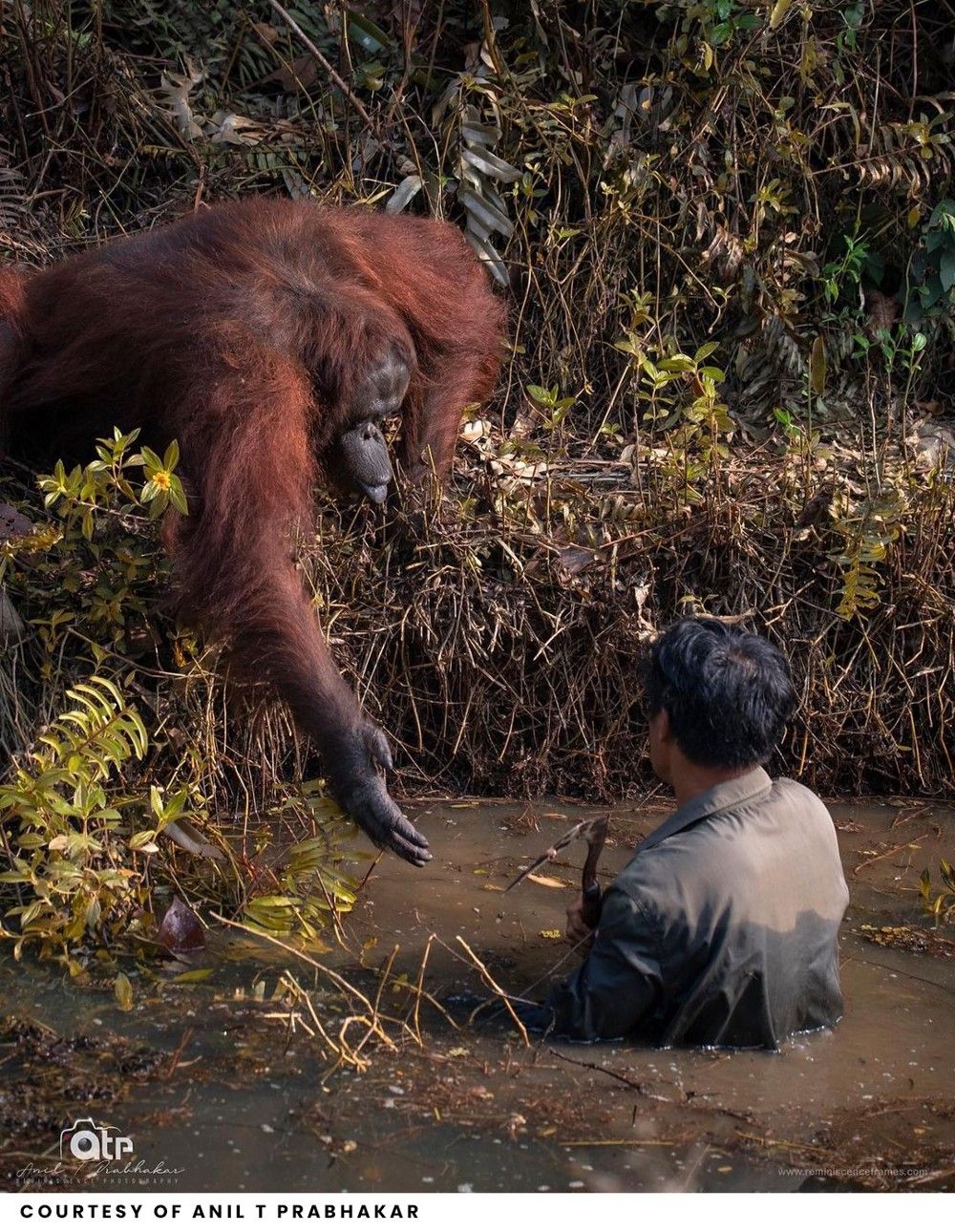
REFLECTING ON THE CBNRM (COMMUNITY BASED
NATURAL RESOURCE MANAGEMENT) MODEL IN ITS CURRENT FORM- PROTECTED AREAS AND THEIR
POTENTIAL TO IMPROVE THE STATUS QUO.
By Izak Smit, chairperson of DeLHRA
(Desert Lions Human Relations Aid).
21 May 2021
This is OP-ED is simply based on the view
of the author based on 32 years of regularly traversing the areas in question
of which the last ten years were spent more intensively focussing on Desert
Lion Human Conflict whilst working with Conservancies and the affected communities.
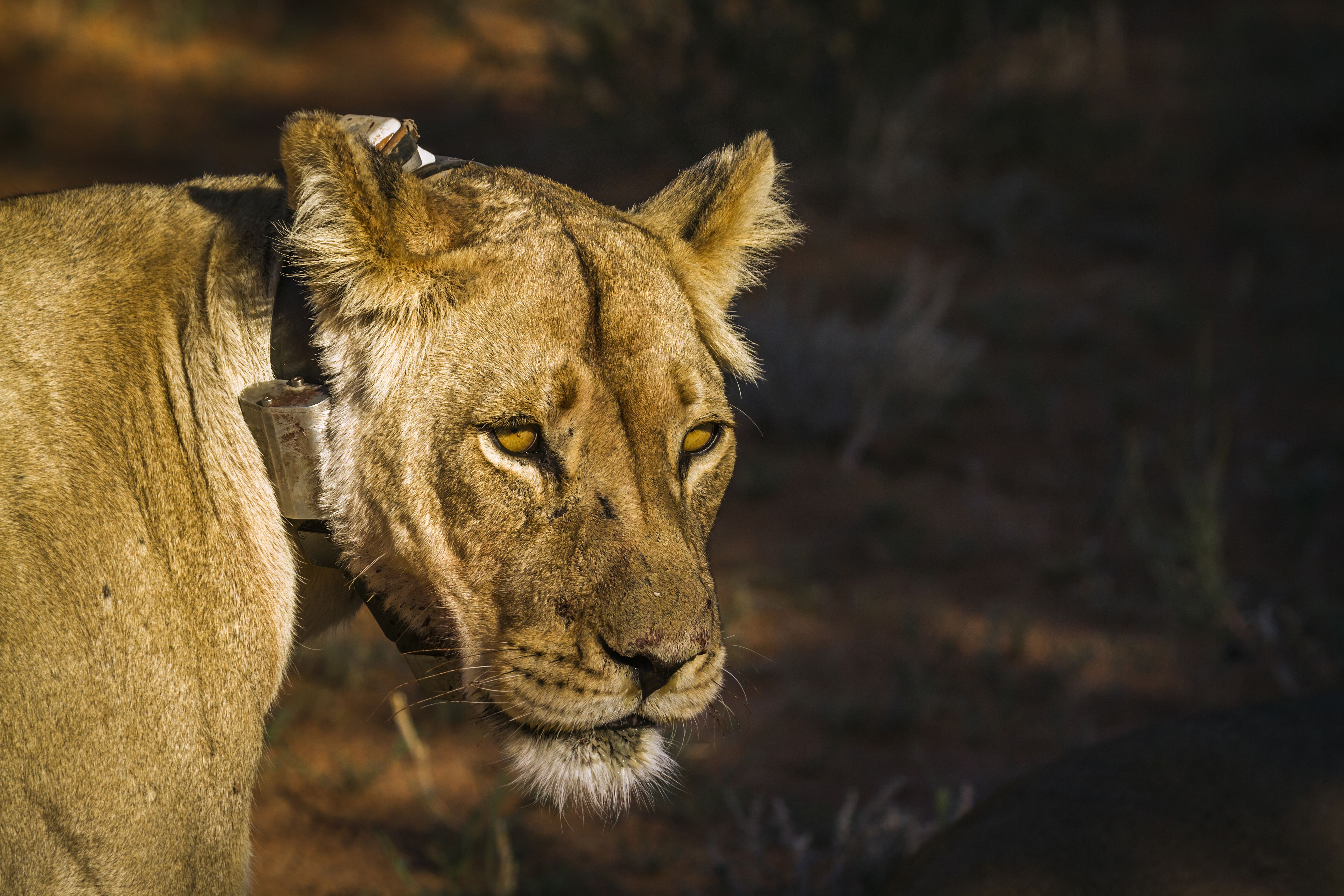
NAMIBIAN CONSERVATION-BEFORE AND AFTER
INDEPENDENCE 21 MARCH 1990
Before independence, the “Suidwes Afrika
Natuurbewaring” was pretty much run autonomously in a military fashion where
every-one knew their place and a low tolerance for outsiders was maintained.
Discipline was the order of the day and maintenance of infra-structure a high
priority. To the old “Bokkiewagters” (Game Rangers), it was not a job but a
calling and way of living. The top structure ruled with an iron fist and outsiders
were viewed with suspicion and marginalized as the brotherhood stuck together,
much like in the army those years. Appointments were made on the basis of
strict vetting and merit and promotions were hard earned. No one dared to
question or challenge the top “Brass” and the public had “no business
interfering with the work of the Ministry”. NGO’s were unheard of and had no
justification as “Natuurbewaring” had it all “under control”.
In 1990 Namibia gained independence from
the South African Government and this culture was inherited by the new
governing body. The management structure was now changed, and the experienced
and knowledgeable pale males had to clear their desks as cadre deployment
became the order of the day. Few remained as mentors were needed for the
transition as empowerment manifested. Those who remained found themselves in
powerful positions as advisors and mentors as the transition process leaned
heavily on their experience and expertise. Those who were replaced who took the
“Golden Handshake” early retirement/retrenchment packages had to seek new
opportunities where their skills would be relevant and valued. This led to many
of them, people like Jan Joubert, starting up Tourism Safari businesses as
tourism started growing in Namibia while some later formed NGOs.
THE ERA OF NGO’s-
GARTH OWEN SMITH-HIS BOOK “AN ARID EDEN”
AND MARGIE JACOBSON’S BOOK “LIFE IS LIKE A KUDU HORN”
As things developed and the new Ministry of
Environment and Tourism settled in and went through its settling/growing pains,
over the years capacity and resources seemed to have become increasingly
challenged and the ministry’s mandate became more and more impossible to
execute without outside/outsourced assistance. Enters the era of the NGO’s.
Some of the ex-Nature Conservation staff availed themselves and, in time, many
NGO’s were formed. The IRDNC, Integrated Rural Development and Nature
Conservation formed by Garth Owen Smith was one of many. These then joined the
umbrella body NACSO, Namibian Association of CBNRM Support Organisations.
Funding and grants from organisations like WWF floated the financial boats of
these NGO’s and MOU’s with the Ministry of Environment and Tourism (MET) were
signed and collaborations forged. To this day this structure pretty much rules
the roost.
In the beginning Garth Owen Smith’s
organisation was also faced some stonewalling from the MET as can be seen in
his book “An Arid Eden”. In time, after some lengthy and laborious
persuasion, the MET endorsed his
proposed CBNRM (Community Based Natural Resource Management) model and the
first Conservancies were registered in the early 1990’s. The NGO’s that were
“in the fold and toeing the line” now had the political clout needed to operate
and relationships with the newly formed Conservancies were forged. Although
there was some collaboration, each NGO operates independently, has its own
mission and vision, agenda and interests. Many livelihoods are dependent on the
funding these NGOs receive and a number of ex Nature Conservation employees
from the old dispensation found a home here and their knowledge and experience
stood to benefit their organisations.
These NGOs now became the advisors and
consultants of many of the Conservancies and functions like Game counts and
others that the Conservancies’ inexperienced managements needed help with were
often outsourced from/guided by said NGOs.
The books written by the late Garth Owen
Smith, “An Arid Eden”, and his partner Margie Jacobsohn, “Life is like a Kudu
Horn”, gives good perspective of the
history of the IRDNC and how it was established.
While the title of Garth’s book, an Arid
Eden, was appropriate until about 2013/14 it no longer holds true in the face
of the decimation of the wildlife in the conservancies over the last about
seven years. Someone bitterly commented that the title of the book, “Life is like a Kudu Horn”, is actually more appropriate
now since a Kudu Horn is configured like a screw and the game population in the
conservancies are “pretty screwed” right now.
THE RELATIONSHIP BETWEEN MEFT AND
NGO’s-EX BOKKIEWAGTERS AND LIVELIHOODS-DAISY CHAIN AND INTERDEPENDENCE
As many of the NGOs are dependent on
authorisations and permits of some kind from the MET, toeing the line as
dictated by the MET had become a pre-requisite. With-holding a researcher’s
permit or an NGOs work permits needed to operate can mean the end of the line
for that entity. Unsurprisingly therefor, bonding became essential. This
resulted in an “exclusive club” and you could decide whether you are in or out
by pledging subservience to the rules or not. This, in return, ensured
“protection of your turf” and kept annoying newcomers/outsiders out. The
previous Permanent Secretary mastered the art of directing this orchestra
through bullying tactics and strategies. It worked well! In one instance a
newcomer was accepted after arranging study grants for 2-3 MET employees
through his organisation first, a fair exchange? Mutually beneficial deals
involving funding and revenue streams sweetened the arrangement or “Daisy chain”
and in some instances a researcher would team up with a select few NGOs who have
big Tourism interests, a win-win situation of note, although in contrast with
some clear permit provisos!
NGO’s AND THEIR AGENDAS AND
INTERESTS-SPONSORSHIPS
This situation therefor leaves us with a
regulating body dependent on a group of supporting NGOs for the purpose of
executing the ministry’s mandate that are being run like businesses and funded
by corporate donors and sponsors in need of maximum exposure and recognition
for “fulfilling social responsibilities”. Some of the NGOs are also supported
by the private sector and more particularly, tourism operators in a mutually
beneficial arrangement which included commercial film making and the rare high
valued privilege to see collared Lions.
Hang on you say, this sounds like mud
slinging and the usual handbag in-fighting amongst conservationists in
competition. No, it is not, it needs mentioning to give perspective on why the
current status quo needs a make-over as the CBNRM model evolved negatively
being driven by self- serving outside influences.
THE OUTDATED CBNRM MANAGEMENT MODEL-NEED
FOR MAKEOVER-SHORTCOMINGS AND MAKE UP- TRIPLICATION OF WILDLIFE-BLURRING OF
LINES-HAVING CAKE AND EATING IT-LEGISLATION AND PROTECTION
When a car starts to smoke, cough, wheeze
and generally starts performing poorly, one is forced to check for the problem.
Is it the gearbox, differential, engine or electrics maybe? If it is all of the
above, you change the whole damn thing.
The CBNRM mode has been going since the
early 1990s which makes it about 26 years old. Things evolve and influences
like climate change changes the variables and essence of such a model over time
and it, inevitably at some stage, needs reviewing. Desertification, both as a
result of overgrazing and climate change has progressed to a point where so-called
traditional farming, nomadic pastoralism and even subsistence farming may no
longer be sustainable or even possible. Traditional farming, in the modern
context has reached proportions in places emulating modern commercial farming
which has no place in an unsuitable, sensitive, arid environment.
Diversification of income is much needed and no traditional, albeit
destructive, livestock farming can hold the environment hostage to its needs
any longer. All of us on this planet are going to have to adapt or, yes, die! A
sixth mass extinction is not just a rumour, the tangible evidence is there for
all to see!
The CBNRM model caters for “sustainable
use”, which includes both consumptive and non- consumptive exploitation of
resources. Currently the lines are blurred and haphazard “zoning” which is
supposed to distinguish between farming, hunting, general, wildlife and tourism
areas, is just a thought which vanishes with the first signs of a drought when
it all becomes available as “emergency grazing” areas. This of course impacts
heavily on the availability of the very scarce nutrition the Wildlife had
become dependent upon as they adapted over centuries to survive in this hostile
environment.
In many instances we have witnessed semi-nomadic
Himba pastoralists and local farmers simply ignoring the Conservancy rules and MEFT
directives by driving large numbers of cattle into ephemeral rivers and areas
“zoned” for Wildlife and Tourism. Even worse, Reed beds would be set alight in
order to induce new growth for the starving cattle with no regard to the
destruction of the environment and ecology. The Huaruseb, Hoanib and Huabrivers
in particular became linear farms in these times to the detriment of and
causing major disturbance to the Wildlife. Since the moratorium on hunting and
utilisation had been announced after it had been discovered that the Game
populations were becoming precariously low, bushmeat poaching increased which
took its toll on the few remaining animals tasked with repopulating the
conservancies in future. Allowance was made for Game to be hunted for purposes
of catering for traditional leadership meetings and in many instances the
animals could not even be found. Some Farmers openly defied the MEFT and Law
enforcement agencies during the drought and the environment paid the price as the
result. The outcome was quite predictable and is now manifesting in starving
predators and ecological systems imploding.
The question that now arises is whether
having your Cake and eating it is possible in this context? The very
environment that attracts Tourism is under siege by Agriculture, the latter
which is clearly failing and not sustainable. In the end it will be either or……
. Either the Environment will have to be protected or it will logically be
overrun and turned into the wasteland it is already fast becoming. The Ministry
of Environment, Forestry and Tourism (MEFT) is regularly on record stating that
the CBNRM model is so successful and serves as a role model to the rest of the
World. It claims that Wildlife had “triplicated” in numbers and that the
current lack of game in the conservancies had been solely caused by the nasty
drought…. . While it is true that game in Namibia has vastly increased over the
years, this can mostly be attributed to the commercial farm owners on freehold
land diversifying in order to survive financially and to optimize their return
on investment. This had been instrumental in building a big Hunting Industry
which contributes handsomely to the GDP. The difference being that the owners
of the game manage it like a business and carefully manage and invest in their
own stock for long term gains. The conservancies, however, being on state land,
are not managed in the same way at all and no real ownership and accountability
exists in this model. Windows of opportunity for corruption, maladministration
and mismanagement are abundant and exploited. This is sadly reflected in the statistics
regarding the high failure rate on financial audits of conservancies in Namibia
(over 84% failed?) and the current, sorry state of affairs regarding the
depleted natural resources.
All of this could not have been intentional
and a large portion of this failure could be attributed to the fact that the
management committees are simply in most cases not equipped to run these
“Parks”. Office bearers in responsible positions in many instances do not have
the knowledge, experience, acumen and training to execute their portfolios. I
do not fix my own plumbing as I would flood the house and possibly the town,
therefore I outsource a Plumber for that purpose. I also do not perform Heart
surgery as I am not qualified to do so. The same holds true here and it is
expected of these people to perform such tasks up to the same standards as a
highly qualified National Parks management structure would deliver? Oh, hang
on, there are many NGOs advising and assisting said Conservancies…. ? Now
therein lies the problem. Different agendas, interests, missions and visions
and in many cases the exact same lack of knowledge, training, experience etc.
and so forth exists within these NGOs. No, badmouthing them is not the purpose,
merely stating the facts here. A lot of confusion and the evident failure of
the current status quo being reflected in the affairs of the conservancies and
state of the environment bears witness to this. Also, after 26 years, if
properly empowered, surely the conservancies would have been able to function
effectively and independently by now?
Let
us face the brutal truth, without insulting any party, the CBNRM model needs a
make-over of note and the drawing board beckons while time runs out!
In our humble opinion, the example of
Africa Parks, set in Africa over the past years as a turnaround specialist is
very relevant. In order to optimize Wildlife and Tourism areas these have to be
identified and clear boundaries defined to begin with. It should then be
gazetted as such, whether as concession area or proclaimed protected area,
either way it must emerge with a status properly protected by legislation and
through law enforcement. Farming, general and hunting areas (the latter clearly
not bordering the protected areas) should be clearly zoned with clear
distinction from the protected areas. This would have the advantage that vast
areas with huge potential like the breath-taking area between the Ugabriver and
the Southern Veterinary fence boundary along the Bergsig/Springbokwasser gate
road including the whole Huab valley can then enjoy the same protection as the
Palmwag concession area and even be integrated with the latter. This will mean
that instead of being a free for all area exploited and damaged by all
currently, it can be developed by concession holders and investors and run like
a park by custodians charged with managing Human Wildlife Conflict, security
and anti-poaching and maintenance while optimizing revenue, creating job
opportunities, skills-development and welfare for the Conservancy communities.
The aim should be proper mentorship and development with clear goal posts
ultimately enabling absolute empowerment over a period. Palmwag concession has
proven its success with Gondwana lodge and the Hoanibriver Wilderness Lodge
contributing substantially to the conservancy coffers. The wheel in this
instance, does not need to be re-invented but merely copied and pasted by
including more protected areas.
Land use guidance and assistance to
subsistence farmers enabling diversification to ensure food security while
downscaling livestock farming to provide sustenance instead of being managed as
a “traditional currency” will be of paramount importance. Considering what the
Israelis harvest from their equally arid Desert there is no shortage of options
that should be investigated and developed. Education and training will be key. Continuing
on the same destructive path currently followed in the name of “traditional
livestock farming” will be short lived considering the progressive
desertification and change and is not negotiable really.
THE DROUGHT AND POOR MANAGEMENT-RESULTS
IN PROTECTED AREAS VERSUS CONSERVANCIES
Good rains on and off had been experienced
between 2007 and 2012 and it was a “time of abundance” during which the
predators, a good barometer of the health of an ecosystem, and their prey
species had multiplied to a point considered as being well balanced. Game
counts, for such an arid environment with below 150 mm of rain falls per year,
were impressive. This was, however, clearly the end of a “boom cycle” and a dry
cycle was to be expected as per the normal and natural ebb and flow trending of
“seven fat and seven lean years” as a well-known, historical phenomena.
The quotas released for the “sustainable” utilisation
of the game were unprecedented and overly generous but according to those
responsible for the game counts, justifiable. People like the well- known
environmentalist Christiaan Bakkes and
myself frowned upon this and we made our disgust publicly known at the time. We encountered Zebras
that were clearly wounded and left to die in the “Red line” veterinarian fence near
Palmwag during one cull of 70 Hartmann Mountain Zebra and Christiaan Bakkes’
article in the Namibian newspaper, titled “End of the Game” described the waste
and massacre on the Giribes Plains amongst other similar cases of
indiscriminate plundering (as per his book “Plunderwoestyn”). This earned him an
end to his long career in the Tourism industry in Namibia due to the
traditional leaders and Chiefs’ wrath incurred.
Not very long after this, filling hunting
quotas started to become problematic as the number of animals available simply
did not match the numbers on the permits anymore. Hunters started to abandon
concessions due to non-viability and the question arose, “where are the
animals?”. A Moratorium on Shoot and Sell and own use was hurriedly imposed as
late as 2017 and after confronting those NGOs responsible for the game counts, we
were “confidentially” told that the scientific formula used for the estimation
of the game numbers had been found to have been flawed and hence optimistically
biased.
With no means of putting the Toothpaste
back into the tube, the damage had been done and we witnessed the resultant
sharp escalation of Human Lion Conflict in these areas from 2014/15 onwards. As
a consequence, this had a big impact on Lion mortalities through poisoning and
shooting by retaliating farmers. In one single incident a Lioness pregnant with
four fully developed and ready to be born, cubs was shot and killed.
When comparing the variance in Predator/Prey
ratios in protected areas, i.e. Palmwag concession, Etosha Park etc. versus the
same in the conservancies, the contrast is shocking. The conclusion can only be
that management, or the lack of it, should be held responsible since the
protected areas had gone through the exact same ordeal caused by the drought.
It has become apparent that, when “sustainable utilisation” quotas were
calculated no, or inadequate provision had been made for Predator requirements,
loss of game to poaching and disease/natural causes and that no contingency/allowance
had been made for core herds needed to repopulate the areas once the wet/boom
cycle begins. The results were clearly starving predators and Human Lion
Conflict escalating to an all-time high. Whenever Humans upset the equilibrium
in nature, Newton’s Law comes into play…..
THE TURNAROUND AND SOLUTION-MANAGEMENT,
BENEFITS-AFRICAN PARKS-REVERSING HABITAT SHRINKAGE-% OF LAND UNDER
“CONSERVATION”-SUCCESS CLAIMS BY MEFT
While it is good and well for the MEFT (Ministry
of Environment, Forestry and Tourism) to boast that about 43% of land in
Namibia is under conservation, the question arises as to how the land outside
of protected areas in this category is being managed and why the disastrous results
and outcome. Having huge areas under conservation devoid of Wildlife due to
poor or inadequate, inefficient management may look good statistically but in
real terms defeats the object. It is common knowledge that the habitat of Lions
in Africa has shrunk by about 80% over that last decades and the same holds
true for the Kunene region, formerly known as Damara and Kaokoland. Where Lions
used to roam from the Ugabriver in the South right up to the Marienfluss in the
North, barring few Lions, most now only occur in the protected Palmwag
concession area. Recently the whole Huabriver Lion population had to be
translocated to a sanctuary due to starvation and more will follow. It would
make more sense to identify areas in Conservancies ideal for Wildlife and
Tourism and convert those to “Park-like concessions” with the appropriate
legislative and statutory protection surely?
A Perfect example of such successful
turnaround endeavours is that of African Parks. So far, they have taken over
management of about nineteen Parks in Africa in countries where conservation
had failed in totality. Their successes in Liuwa Plains and other parks speak
for itself. Not only do they manage the parks but the positive effects of their
Human Wildlife Conflict management, anti-poaching, skills development, job
creation, community welfare and upliftment etc. has made a huge, positive
impact on the lives of those living in close proximity to the parks as well as
conservation. By employing experts and applying sound principles, management
plans and strategies their story is one of success. It simply cannot be
expected that the same results could be obtained by incapable, inexperienced
locals advised by a a mix of, own interest driven NGOs on a hit and miss basis.
The shockingly low game counts leading to the current disastrous ecological
imbalances in the conservancies bears witness to this. The rather desperate,
urgent last-minute efforts by the MEFT to outsource the services of a consultant/advisor
unfortunately casts doubt on their grip on the situation and gives the
impression that they may be at the end of their tether…
CONCLUSION-
The reality is that it is very late in the
day and if Namibia is serious about continuing on the path towards successful
conservation of its natural heritage, no amount of political correctness will
realise this.
We need to accept that things are wrong,
learn from past mistakes and take some concrete action, even if unpopular in
some circles. One cannot simply put a Band aid on a bullet wound. The solutions
are there and need to be expeditiously implemented. For this, Political Will is
required first and foremost. Own interests/livelihoods, egos and needs will
have to take a back seat. Much like the climate change phenomena where some
drastic changes are needed to bring down CO2 emissions which involve sacrifices
and a paradigm shift, conservation has also arrived at a clear crossroad.
In hindsight, the words of Chris Bakkes may
have proven to be prophetic, this could indeed be the “End of the Game” unless
acted upon with urgency….. .
It
would be sad to see the CBNRM model, Garth-Owen Smith’s lifelong dream, disappear
in the Desert dust….
.png)
